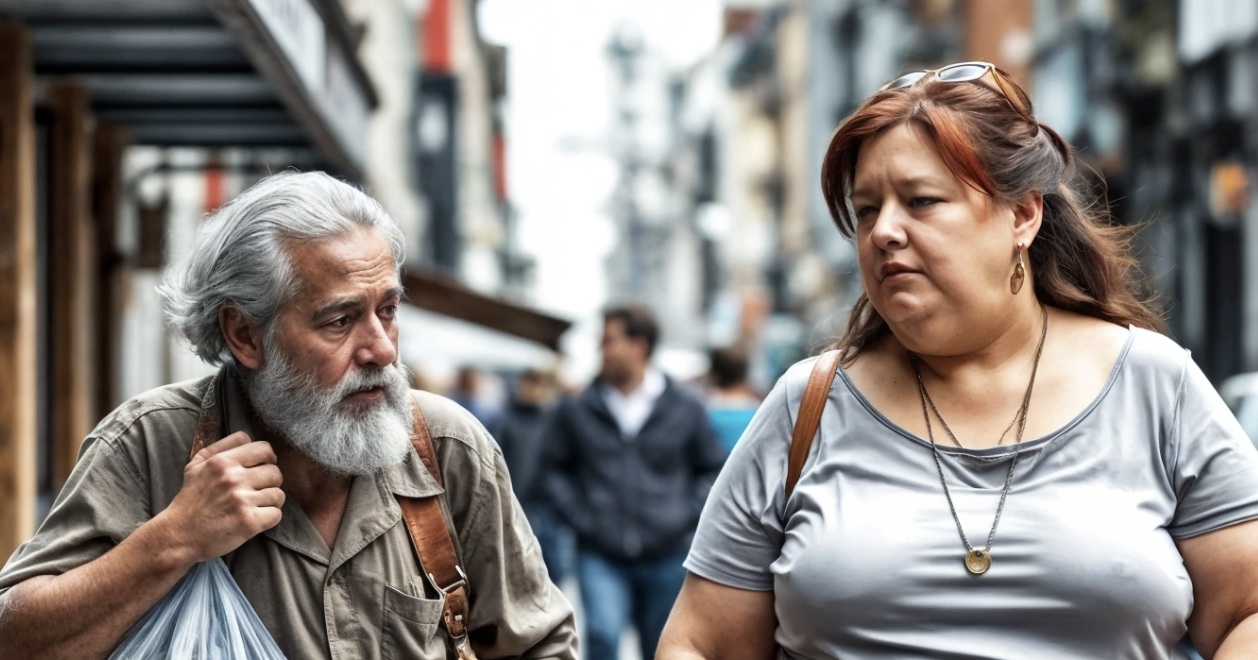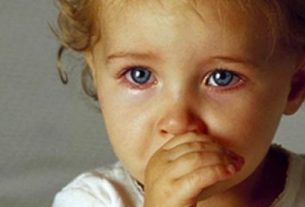“— Miss, may I help you?” he called to the woman, noticing how she was struggling to carry two heavy bags.
“— Sorry to approach so suddenly, but it looks like the bags are about to slip from your hands. Let me carry them for you.”
“— Oh, really? Are you sure? Aren’t they too heavy?” the woman smiled shyly. “— Thank you very much.”
The man easily took the bags as if they were empty and started walking ahead with a broad, confident stride. The woman, pretty and a bit plump, hurried after him, trying not to fall behind. Together they looked almost comical: he — tall, strong, with a wide, marching gait like in a parade; she — small, soft, round like a fresh cheesecake, with curls bouncing with every step. She had to take two steps for every one of his.
“— Please, slow down a bit!” she gasped, “— I’m completely out of breath.”
He, as if coming to himself, turned around:
“— Sorry, I got lost in thought.”
“— If you don’t mind me asking, what were you thinking so deeply about?” the woman asked, looking at him closely.
Her name was Galina, and she immediately noticed that the man was dressed not for summer — his clothes were worn, patched in places, and he looked lost, as if he had accidentally wandered into this world. Her curiosity wouldn’t let her just walk silently beside him.
“— Come on, tell me, what made you so pensive?”
“— It’s all about myself… about life,” he sighed.
“— What’s wrong with it? Is life hard for you?”
“— No, not that…” he shook his head. “— I just think a lot.”
“— Ah, maybe you drink too?” she asked cautiously.
“— No, not at all! I’m not that kind of person.”
“— Thank God,” Galya nodded with relief. “— And what’s your name? By the way, I’m Galina, but you can just call me Galka.”
The man hesitated, as if trying to remember or, on the contrary, trying to forget something important.
“— They call me Vaska… that’s my nickname.”
“— A nickname? You don’t like your real name?”
“— It’s not that…” He lowered his gaze. “— I just don’t know what my real name is.”
Galina froze in surprise but quickly pulled herself together:
“— So, you don’t remember?”
“— Exactly. I have memory loss. They found me on the highway, barely alive. Dirty, bruised, in torn clothes. I was lying there like a discarded puppy. Someone stopped, called an ambulance, and they took me to the hospital.”
“— My God… And you remember nothing about yourself?”
“— Not a single memory. Sometimes some images appear: faces, rooms, bits of conversations, flashes of light… But it all feels like someone else’s movie.”
“— What happened after the hospital?”
“— They sent me to an orphanage. They gave me a temporary name — Vasiliy. I’ve been living with it ever since. It’s good that I’m not on the street — I have a roof over my head, food, work.”
“— What kind of work do you do?”
“— Whatever comes my way. Odd jobs: loader, market helper, sometimes I help the butcher, cleaning. I earn a little, but enough to live.”
“— And what did you do before? Do you remember anything?”
“— Nothing. It’s like I was born again. I had to learn everything from scratch. Not crawling, but living.”
“— You’ve had a tough fate, Vasya. But if you haven’t broken down, you’ll manage going forward. Memory is unpredictable: today it’s silent, tomorrow it might suddenly come back.”
“— Maybe you’re right…”
“— Of course I’m right! Why torture yourself over what you don’t remember? Live with what you have. And I see you’re a strong, hardworking guy. Would you like to find a job?”
“— I’d really like that.”
“— Then come with me. I’ll talk to my employer. She has a big house, a lot to do. Maybe we’ll find something for you.”
“— That’s great. Let’s go, what are we waiting for?”
Only then did Vasiliy realize they had been standing still for several minutes, attracting the attention of passersby.
“— Is it far to go?”
“— No, very close. I usually go by car, but today the driver is busy — so I came on foot. We ordered a turkey for the employer.”
“— And what do you do for her?”
“— I’m a cook. The job is hard, but the conditions are good. The employer is kind, though quiet. She changed a lot after the death of her son and husband. But she pays generously and treats no one badly.”
They approached large wrought-iron gates. Behind them stood a two-story brick house, surrounded by greenery. Jasmine bloomed on either side of the gate, filling the air with a sweet aroma. Vasiliy suddenly stopped. Something stirred in his chest, as if memory wanted to wake — but then vanished like smoke.
“— Why did you stop? Come on, don’t be afraid.”
They entered the house, walked along a neat path, and ended up in the kitchen — spacious, bright, cozy, filled with the smell of home-cooked food.
“— Here we are. This is my little world — here are my pots and pans. Come in, look around. Meanwhile, I’ll bring lunch to the employer and ask about work for you. Something will surely turn up.”
Vasiliy looked around. For the first time in a long while, he felt a strange sensation — warmth, comfort, and even a certain familiarity.
“— Sit for a bit, I’ll be quick. And eat — you must be hungry?” Galina smiled.
After a few minutes, a plate of hot food appeared in front of him, emitting a delightful aroma.
“— Here, try this. It’s still warm. I’ll be back soon.”
“— Thank you… I don’t even know how to thank you…”
“— Don’t mention it!” Galya waved her hand. “— Just eat.”
Vasiliy took a spoon and tasted the food. The flavor was such that he closed his eyes — homemade, familiar, long forgotten. He couldn’t remember the last time he had eaten like that. The feeling was almost frightening.
“— Rimma, may I?” Galina quietly asked, peeking into the room.
The employer was sitting by an old photo album. She often did this — sat and thoughtfully looked through the past. Until now, Galya had never seen inside it — Rimma always hid the album from strangers’ eyes.
“— Thank you, Galya, you can go rest… or wait, did you want something?” Rimma asked, looking at her intently.
Galina shifted nervously, fiddling with the edge of her apron.
“— I wanted… Please don’t be upset, okay? I have an acquaintance… He’s looking for work. Hardworking, young, doesn’t drink. Honest!”
“— Does he have documents?”
“— That’s the problem — no papers. His story is complicated. But he’s a good person, diligent…”
Rimma was silent for a moment, then nodded:
“— Alright, come, show him to me.”
“— Oh, Rimma Alekseevna, but you haven’t eaten yet!” Galya exclaimed.
“— We’ll eat later. Let’s go.”
They headed to the kitchen, where Vasiliy was still waiting. He stood by the window, thoughtfully looking into the distance.
“— Vasya, come here please,” Galina called.
The man turned. At that moment, Rimma suddenly went pale. Her lips trembled, she took a sharp breath, and slowly began to sink onto the floor.
“— Rimma Alekseevna! What’s wrong with you?!” Galina rushed to her. “— Vasya, help quickly!”
Together they sat the woman in a chair and gave her some water.
“— Are you feeling better? Should we call a doctor?”
“— No… no need for a doctor… What’s your name?” Rimma addressed the man.
“— Vasiliy.”
“— And your real name? You’re not just Vasya, are you?”
“— I don’t remember… I have memory loss.”
Rimma looked at him for a long time, as if trying to find something deep inside.
“— Klim…” she finally whispered. “— Your name is Klim.”
“— What? How do you know that? I don’t even remember my name myself…”
“— Because I am your mother. I named you myself.”
Galina froze, stunned. Her hands clutched her apron tightly, her gaze darting between them.
“— But you said your son…” she whispered.
“— I thought he was gone,” Rimma quietly answered. “— Please bring the photo album. It’s in the top drawer of the cabinet.”
When she opened it, her voice trembled:
“— My husband and I couldn’t have children for a long time. We dreamed of a baby, but the doctors shook their heads. I cried, Oleg got angry. Until his father — my father-in-law Klim — took us to his village. He said, ‘Leave this place, it’s all stress and hospitals here. Live with nature, regain your strength.’”
She turned the page.
“— That’s exactly where it happened. I found out I was pregnant. You became our miracle. And I named you after my father-in-law — Klim. He didn’t live to see your birth but knew he would become a great-grandfather.”
Vasiliy listened without looking away.
“— You were a kind, calm boy. A teacher’s favorite, an excellent student. You loved animals and spent all your time near the school’s pet corner. And then…”
Rimma sighed.
“— Oleg wanted you to follow in his footsteps. He made you into a ‘man with a future,’ as he said. I tried to protect you, but he was adamant. You began to resist: skipped classes, talked back to teachers, came home in bad shape. I begged you to stop, to go back to who you were. But you didn’t listen. One day we had a big fight. Oleg said, ‘Either he gets his act together or he leaves and never comes back.’ I broke down then. You slammed the door and said we were no longer needed. Three days later we were told to identify a body. The face was unrecognizable, but there were the watch, passport, phone… We believed it. We buried you. Soon after, Oleg died. His heart couldn’t take it…”
Tears streamed down Rimma’s cheeks. Vasiliy looked at the photo of the boy who was painfully familiar — like a reflection in water. Fragments of images flickered before his eyes: laughter, the smell of smoke from a campfire, the warmth of mother’s hands…
“— Mom…” he finally whispered, almost inaudibly.



